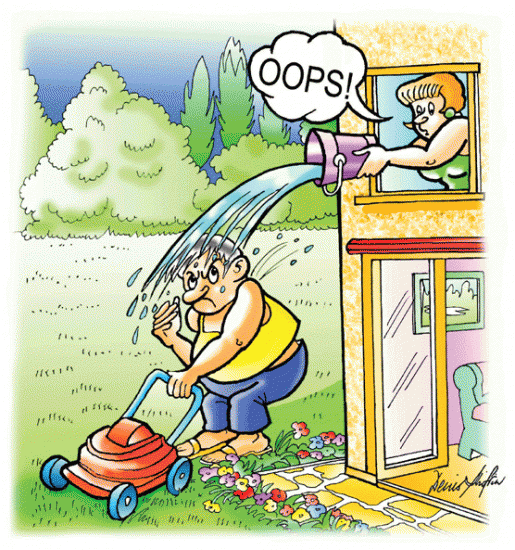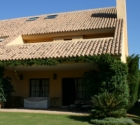
Those of us with the good fortune to have a garden or backyard of some sort at home are already aware that our good fortune is about to cost us a small fortune. The government has decreed that water in excess of what is deemed to be an average consumption per person per month (about 4 cubic meters) is to be charged for at an exorbitant price; the rate for excess consumption above the average, previously about 7.5 shekels per cubic meter, has now gone up to about 28 shekels per cubic meter. Local authorities are rubbing their hands with glee, since they will continue to obtain water from their suppliers at the old rates and will simply pocket the additional revenues. It remains to be seen whether or not this surcharge will have a measurable effect on the overall demand for domestic water.
In Israel, a lawn requires 4 liters of water per square meter per day. This means that your 100 square meter lawn is going to gulp down some 12 cubic meters of water per month, adding about 335 shekels per month to your water bill. Those who are addicted to their pristine patch of green are now going to have to pay several thousand shekels more per year for the pleasure of mowing it, weeding it, feeding it and just occasionally sitting outside and enjoying it. However there is something you can do to alleviate the strain on your household finances.
Waste water from all domestic sources – wash-basins, kitchen sink, dishwasher, washing machine, showers, baths and toilets – is currently piped into the municipal sewage system, or into septic tanks in areas where there is still no mains sewage. Much of the water from the sewage system, along with some rainwater runoff, is currently recycled and re-used for agriculture and Israel is in fact one of the more efficient users of such recycled water. However the process of purifying such water, involving principally the removal of fecal matter, is costly unless implemented on a very large scale.
For the private domestic consumer seeking to irrigate a small garden, the solution is to separate ‘black’ water (the product of flushing toilets) from ‘grey’ water (the product of other domestic uses. When planning a new house, instead of all water flowing directly into the sewage it is a relatively simple matter to channel the grey waste water from showers and baths directly into a root-irrigation system under the garden lawn. Unlike water from kitchen sinks with food scrap macerators or water from washing machines with high concentrations of detergents, waste water from your shower or bath needs little or no filtration in order to be perfectly adequate for this purpose. No holding tank is required or needed.
As regards existing houses, provided that bathrooms are located adjacent to external walls, any competent plumber can install the pipe-work diverting the waste water required for garden irrigation. The only really important ground rule is to ensure that there will be no ‘crossover’ and no possibility of the grey water mixing with the fresh water supply. It has been estimated that, depending on the extent and capacity of this diversion system, the cost could be recovered over the course of one or two summers by virtue of the consequent reduction in the use of fresh water.
Israeli bureaucracy is notorious for ill-conceived and poorly integrated initiatives. The so-called ‘drought tax’ has not been matched by any attempt to encourage domestic use of grey water, unlike, for example, in Australia where the concept is already well established. On the contrary, the Ministry of Health frowns on such domestic systems claiming that constant monitoring is needed in order to avoid health hazards, and agricultural interests are concerned that domestic recycling will reduce the amount of water available for national recycling programs. So if, after taking professional advice, you are convinced that some sort of system would in your case be worthwhile, don’t ask, but just do it, in the time-honored Israeli way.
For those who are determined to make their home as ‘green’ as possible, it is perfectly possible to recycle grey water from the kitchen sink, dishwasher and washing machine as well. Biologically friendly detergents are available on the market. With additional filtering, recycled water can also be used for flushing toilets and washing cars. However the cost/benefit equation of an expanded system will not always be favorable, especially in smaller homes.
We are constantly being told to save water, to ‘save the Kinneret’, and indeed we can all do more, whether it be by the simple expedient of a brick placed inside the toilet tank or by accepting the advice given during another drought many years ago to ‘shower with a friend’. Saving by recycling domestic grey water deserves more attention at the national level, but meantime we as individuals should certainly look into the matter and help ourselves while helping to keep Israel green.
Editor’s note: for recent articles on water-saving-greener gardens see articles in ESRA magazines # 149, p. 57 “The grass is greener” by G. Deutsch, and # 150, p. 60 “Gardening without water” p. 60.
 DEAR EDITOR 152
DEAR EDITOR 152 TIDBITS, COMMENTS AND ODDITIES-152
TIDBITS, COMMENTS AND ODDITIES-152 TAKE IT LIKE A SOLDIER - A MEMOIR - A Review
TAKE IT LIKE A SOLDIER - A MEMOIR - A Review From Australia with Love
From Australia with Love Monkey Tales
Monkey Tales A fresh spirit of Zionism from Manhattan
A fresh spirit of Zionism from Manhattan Ilan Shachar
Ilan Shachar